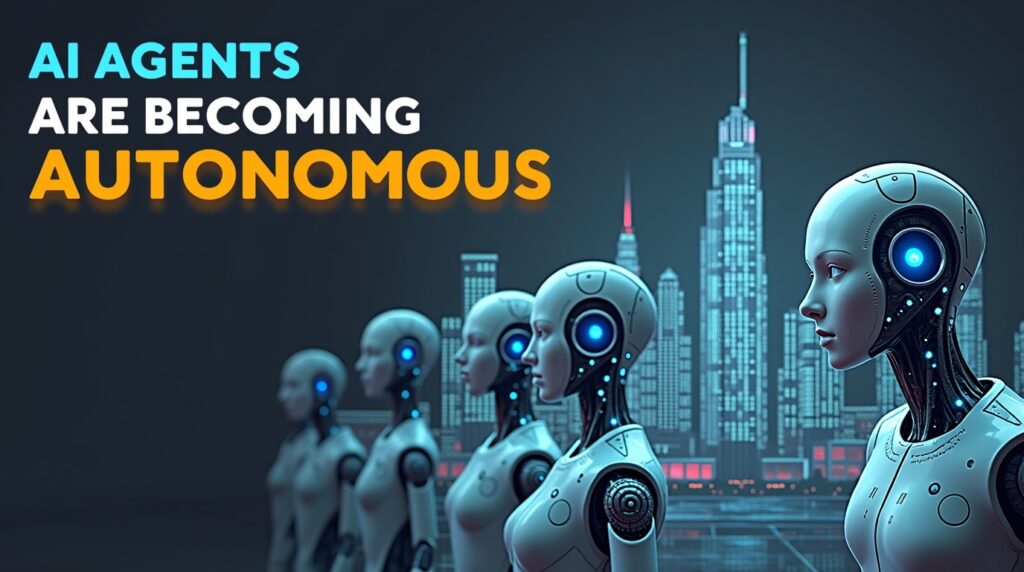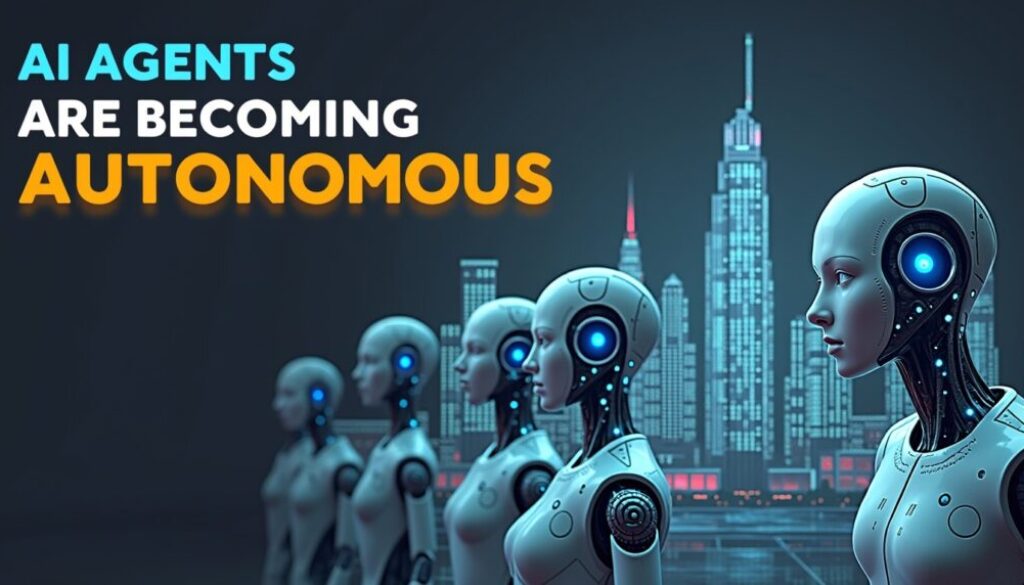AI Agents Are Becoming Autonomous Mean for Work’s Future?

Introduction
AI Agents As the world remains fixated on rising geopolitical tensions from military flashpoints like Iran’s nuclear ambitions to cyber warfare and economic sanctions another silent revolution is unfolding with arguably even more profound long-term implications: the rise of AI agents. These digital entities are rapidly evolving from simple automation tools into powerful, autonomous systems capable of making decisions, learning from data, and transforming entire industries.
Much like the invisible buildup behind a geopolitical confrontation, AI autonomous agents haveconfrontation, A I autonomous agents haveconfrontation, AI autonomous agents have been progressing under the surface until now. With major players like Microsoft AI agents, OpenAI agents, and Google AI agent s pushing the envelope, we are entering an era where human-machine collaboration may redefine the workforce structure.
So, what does this mean for jobs, businesses, and society at large?
Overview
AI Agen ts At its core, an A I agent is a software-based system designed to perceive its environment, process inputs, and take initiatives in order to achieve specific goals. These agents can range from simple customer service bots to complex systems managing supply chains or financial portfolios. The most powerful of these are now entering a stage of “vertical autonomy,” where they can fully manage specific business functions or domains—referred to as specialized AI agent s or AI vertical agent s.
From real estate and healthcare to cybersecurity and finance, AI agen ts are no longer tools they are digital coworkers. Platforms like the AI Agent s directory and repositories such as AI Agent s GitHub demonstrate the increasing accessibility of these technologies to developers and enterprises alike.
Detailed Section
Types of AI agent s
Understanding AI agent s’ types isAI agent s’ types isAI agent s’ types is crucial to grasping their implications. Here are some categories:
- Reactive Agents: These do not store past data; they respond based on current input. Basic chatbots are an example.
- Deliberative Agents: Capable of planning actions based on internal models and goals.
- Learning Agents: These improve performance by learning from their environment, data, and past experiences.
- Collaborative agents:agents: Work with other agents or humans to solve complex tasks.
- Autonomous Agents: These operate independently, making high-level decisions with little or no human oversight.
AI autonomous agent s areAI autonomous agent s areAI autonomous agent s are particularly transformative. They are capable of handling complex workflows an area where companies like Salesforce AI agent s are investing heavily in to revolutionize CRM, sales, and support processes.
Industry Disruption: Examples and Use Cases
Here are some compelling AI agent s examples demonstrating their potential:
- Real Estate: A I for real estate agent s is on the rise. These tools analyze market data, automate listing descriptions, and even negotiate with potential buyers.
- Customer Support: A I voice agent s can now hold conversations almost indistinguishable from humans, streamlining call centers globally.
- Finance: In the AI agent s crypto world, bots analyze blockchain transactions, predict trends, and execute trades autonomously.
- Defense and Surveillance: Although speculative, one could imagine nations using AI agent to monitor activities like Iran’s nuclear facilities in real time, analyzing satellite data and deploying alerts through integrated military networks.
The open-source movement
One reason for exponential growth in this space is the availability of community-driven platforms. Repositories like AI agent s GitHub and discussion forums like AI agent s Reddit are vibrant ecosystems where developers collaborate, share, and iterate.
Additionally, major tech giants democratize access. OpenAI agents, powered by cutting-edge language models, and the Googleand the Google agent development kitsdevelopment kits give developers robust frameworks to build powerful custom solutions. Microsoft AI agent s, integrated with Azure and Dynamics 365, enable seamless enterprise adoption.
If you’re wondering how to build AI agent s, there are multiple tools and courses available online. Sites offering an AI agent course cover everything from theoretical foundations to practical implementations using Python, TensorFlow, and LangChain.
Specialized Applications and Brands
Startups are getting involved too. One notable entry is Manus AI agents, a platform promising full-stack agent infrastructure that handles everything from natural language interfaces to data processing and action generation.
Similarly, the expansion of AI agents directory websites allows businesses to explore and adopt industry-specific agents quickly, promoting agility and innovation across all sectors.
Benefits
1. Increased productivity
By handling repetitive and data-heavy tasks, AI agent s free up human workers to focus on their creativity, strategy, and empathy-driven roles. From logistics to customer support, productivity gains are measurable.
2. Cost efficiency
Companies save millions by deploying AI voice agent s and chatbots. These tools scale without increasing headcount, reducing overhead while maintaining high service levels.
3. Data-driven Decisions
Agents integrated with business intelligence tools can offer real-time insights, make recommendations, and even execute strategies. Imagine a digital agent optimizing marketing spend across channels every minute of the day.
4. Always On
AI agent operate 24/7 without fatigue or error due to stress or distraction. In industries requiring round-the-clock monitoring such as defense or healthcare—this is invaluable.
5. Customization and Personalization
Whether you’re looking at A I for real estate agent s or e-commerce, agents can be tailored to deliver hyper-personalized user experiences based on behavior, preferences, and feedback.
FAQs Section
What are AI agents explained simply?
AI agents are explained in simple terms: they are digital programs capable of making decisions and acting autonomously to achieve goals, often with little human input.
Where can I learn how to build AI agents?
There are many online platforms that offer an AI agent course. GitHub projects, MOOCs, and open-source tools from OpenAI agents and Google AI agents are helpful places to start.
AI agents have business applications.AI agents have business applications.AI agents have business applications.
Absolutely. The best AI agents today are used in marketing, finance, logistics, and customer support. Salesforce AI agents, for example, automate entire sales funnels and customer outreach.
Can AI agents be trusted with sensitive data?
This depends on governance, encryption, and transparency. Organizations like Microsoft’s AI agents are working on compliance and ethical frameworks to build trust in AI deployments.
What’s happening in the open-source community?
Check ai agents GitHub and ai agents Reddit for trending projects and community-led innovations. Developers share tools, integrations, and research papers.
Are these agents replacing jobs?
Some tasks are automated, but AI agents also create distinct roles: prompt engineers, agent supervisors, AI ethicists, and integration specialists. The key is adapting to the evolving workflow dynamic.
Is there any fun trivia about AI agents?
Sure! The term “agent” also pops up in pop culture like AIDA agents of the shield,of the shield, a fictional AI character from the Marvel Universe. And yes, people still confuse AI agents with Air Canada agents when searching online.
Final Thoughts:
AI agents areAI agents areAI agents are not from a distant future it’s our present. From managing cloud operations to analyzing nuclear site imagery, their applications are vast and growing. As these systems become increasingly autonomous, they raise critical questions about ethics, employment, and power distribution in society.
But just as geopolitical shifts like those centered on Iran’s nuclear development—require thoughtful diplomacy, the rise of AI agent s demands intelligent integration. They’re not here to replace us, but to enhance us—if we allow them to do so responsibly.
The future of work will not be man versus machine but man with machine. To thrive, we must understand, regulate, and most importantly, collaborate with these evolving digital colleagues.



